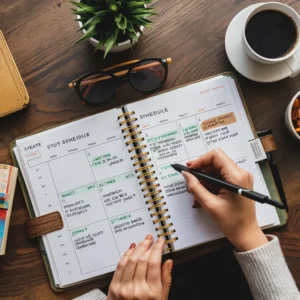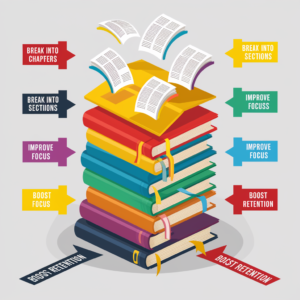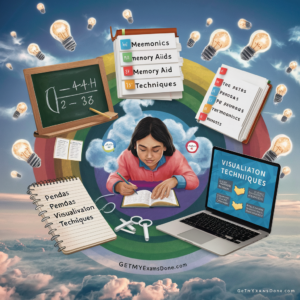Blog
Top 50 Study Tips for Exam Success

Top 50 Study Tips for Exam Success: Preparing for exams can be daunting, but with the right strategies and tips, you can set yourself up for success. Whether you’re a high school student, a college goer, or someone taking professional exams, these top 50 study tips will help you ace your exams with confidence.
1. Set Clear Goals

Set Clear Goals
Before you dive into studying, it’s crucial to set clear, achievable goals. What do you want to achieve in each study session? Are you aiming to understand a concept, memorize information, or solve problems? By defining your objectives, you give your study sessions direction and purpose. Think of goals as your roadmap—they guide you and keep you on track.
2. Create a Study Schedule

Create a Study Schedule
A well-structured study schedule is essential for effective exam preparation. Allocate specific time blocks for different subjects and tasks. This helps ensure that you cover all necessary material and avoid last-minute cramming. Use a planner or digital calendar to keep track of your schedule. Remember, consistency is key—stick to your plan as closely as possible.
3. Find Your Optimal Study Time

Find Your Optimal Study Time
Are you a morning person, or do you find you’re more productive at night? Identify when you are most alert and focused, and schedule your study sessions during these peak times. Studying when your brain is at its best helps improve retention and understanding of the material.
4. Choose the Right Study Space

Choose the Right Study Space
Your study environment plays a significant role in how well you absorb information. Find a quiet, well-lit place free from distractions. Make sure your study space is comfortable and has all the materials you need. This might be a library, a dedicated home office, or a cozy corner in your room.
5. Break It Down

Break It Down
Breaking down your study material into manageable chunks can make learning less overwhelming. Instead of tackling a whole textbook at once, break it into chapters or sections. This method, known as “chunking,” helps improve focus and retention.
6. Use Active Learning Techniques

Use Active Learning Techniques
Active learning involves engaging with the material in a meaningful way. Instead of passively reading or highlighting, try summarizing information in your own words, asking yourself questions, or creating mind maps. Active learning techniques promote deeper understanding and long-term retention.
7. Take Regular Breaks

Take Regular Breaks
Studying for long periods without a break can lead to burnout. Implement the Pomodoro Technique—study for 25 minutes, then take a 5-minute break. After four cycles, take a longer break. Regular breaks help maintain high levels of productivity and focus.
8. Stay Organized

Stay Organized
Keeping your study materials and notes organized can save you a lot of time and frustration. Use folders, binders, or digital tools to categorize and store your notes and resources. An organized workspace also contributes to a clearer mind.
9. Practice Past Papers

Practice Past Papers
One of the best ways to prepare for an exam is by practicing past papers. They give you a feel for the format and types of questions that will be asked. Timed practice also helps improve your time management skills during the actual exam.
10. Use Mnemonics and Memory Aids

Use Mnemonics and Memory Aids
Mnemonics are memory aids that help you recall larger pieces of information. Techniques like acronyms, visualization, and association can make memorization easier and more fun. For instance, use the acronym “PEMDAS” to remember the order of operations in math: Parentheses, Exponents, Multiplication, Division, Addition, and Subtraction.
11. Teach What You Learn

Teach What You Learn
Explaining concepts to someone else is a powerful way to solidify your understanding. If you can teach a topic clearly, it means you have a good grasp of it. Try studying with a friend or family member and take turns teaching each other different topics.
12. Stay Healthy

Stay Healthy
Your physical health significantly impacts your cognitive abilities. Ensure you’re getting enough sleep, eating nutritious foods, and exercising regularly. Avoid consuming too much caffeine or sugar, as they can lead to energy crashes.
13. Seek Help When Needed

Seek Help When Needed
Don’t hesitate to ask for help if you’re struggling with a topic. Approach your teachers, join study groups, or use online resources and forums. Sometimes a different perspective or explanation can make all the difference.
14. Stay Motivated

Stay Motivated
Keeping your motivation high is essential for consistent study habits. Set small rewards for yourself after completing tasks or reaching milestones. Surround yourself with positive influences and remind yourself of your long-term goals and the reasons why you’re studying.
15. Develop Good Note-Taking Skills

Develop Good Note-Taking Skills
Taking effective notes is crucial for retaining information. Use methods like the Cornell Note-Taking System, which divides your paper into sections for notes, main ideas, and summaries. Good notes help you review and understand the material more effectively.
16. Use Technology Wisely

Use Technology Wisely
Leverage technology to enhance your study sessions. There are numerous apps available for time management, flashcards, and note-taking. However, be cautious of distractions like social media—use technology to aid, not hinder, your studies.
17. Stay Positive

Stay Positive
A positive mindset can greatly influence your study outcomes. Believe in your ability to learn and succeed. When you encounter difficulties, view them as opportunities to grow rather than obstacles. Positive thinking helps reduce stress and enhances focus.
18. Join Study Groups

Join Study Groups
Study groups can be incredibly beneficial. They provide support, different perspectives, and motivation. When you study with others, you can share knowledge, quiz each other, and explain concepts, which reinforces your own understanding.
19. Balance Study and Leisure

Balance Study and Leisure
While studying is important, so is taking time to relax and recharge. Balance your study schedule with leisure activities you enjoy. This helps prevent burnout and keeps you motivated. Remember, quality of study time is more important than quantity.
20. Regularly Review Your Notes

Regularly Review Your Notes
Don’t just take notes—review them regularly. This reinforces your memory and helps identify areas that need more attention. Schedule weekly reviews to keep the material fresh in your mind and to track your progress.
21. Prioritize Difficult Subjects
Tackle the most challenging subjects first when your mind is fresh. Prioritizing difficult topics ensures they get the attention they need. Once you’ve made progress on tough subjects, you’ll feel more confident and motivated to continue.
22. Understand Your Learning Style
Everyone has a unique learning style. Some are visual learners, while others are auditory or kinesthetic learners. Understanding your preferred learning style helps you tailor your study methods for maximum effectiveness.
23. Use Flashcards
Flashcards are a great tool for memorization. Write a question or term on one side and the answer on the other. Review your flashcards regularly to reinforce your memory. They’re also portable, making them easy to use on the go.
24. Develop Critical Thinking Skills
Critical thinking involves analyzing and evaluating information rather than just memorizing it. Ask yourself questions about the material, such as why it’s important, how it relates to other topics, and what implications it has. This deepens your understanding and prepares you for complex exam questions.
25. Stay Hydrated
Drinking plenty of water is essential for maintaining concentration and cognitive function. Keep a water bottle with you during study sessions and take regular sips to stay hydrated.
26. Get Plenty of Sleep
Adequate sleep is crucial for memory consolidation and overall brain function. Aim for 7-9 hours of sleep per night, especially before exams. Avoid all-nighters, as they can negatively impact your performance.
27. Exercise Regularly
Physical activity boosts brain function and reduces stress. Incorporate regular exercise into your routine, whether it’s a daily walk, a workout session, or a sport you enjoy. Exercise helps keep your mind sharp and your body healthy.
28. Avoid Multitasking
Focus on one task at a time for better efficiency and retention. Multitasking can lead to divided attention and lower quality of work. Give each subject or task your full attention during study sessions.
29. Use Study Apps
There are numerous study apps designed to help you stay organized and enhance your learning. Apps like Quizlet, Evernote, and Forest can aid in creating flashcards, taking notes, and maintaining focus.
30. Stay Curious and Ask Questions
Curiosity drives deeper learning. Don’t be afraid to ask questions about the material you’re studying. Seek to understand the “why” behind concepts. This inquisitive approach helps you engage more deeply with the content.
Read This Article:
31. Create a Study Plan for Each Subject
Each subject may require a different approach. Create a specific study plan tailored to the needs of each subject. Identify key topics, allocate time for review, and plan practice sessions to reinforce your understanding.
32. Practice Time Management
Effective time management is critical for balancing study and other responsibilities. Use tools like to-do lists, calendars, and timers to manage your time efficiently. Prioritize tasks and set deadlines to keep yourself on track.
33. Use a Variety of Study Resources
Don’t limit yourself to one type of study material. Use textbooks, online resources, videos, and practice tests to gain a comprehensive understanding of the subject. Different resources can offer varied perspectives and explanations.
34. Take Care of Your Mental Health
Mental health is just as important as physical health. Take time for self-care, manage stress, and seek support if needed. Practices like mindfulness and relaxation exercises can help maintain your mental well-being.
35. Practice Mindfulness and Meditation
Mindfulness and meditation can improve focus, reduce stress, and enhance overall well-being. Incorporate short mindfulness exercises or meditation sessions into your daily routine to help stay centered and calm.
36. Avoid Procrastination
Procrastination is a major barrier to effective studying. Break tasks into smaller steps, set deadlines, and use strategies like the Pomodoro Technique to stay productive. Tackling tasks immediately helps build momentum and reduces last-minute stress.
37. Set Up a Reward System
Reward yourself for meeting study goals. Small rewards like a treat, a break, or a fun activity can motivate you to stay on track. Celebrating achievements, no matter how small, keeps your motivation high.
38. Reflect on Your Progress
Regularly reflecting on your progress helps identify strengths and areas for improvement. Take time to evaluate what’s working and adjust your study strategies as needed. Reflection fosters continuous improvement and effective learning.
39. Stay Away from Distractions
Identify and eliminate distractions in your study environment. Turn off notifications, limit social media use, and create a focused study space. Reducing distractions helps maintain concentration and productivity.
40. Keep a Positive Attitude
A positive attitude can make a big difference in your study sessions. Believe in your ability to succeed and stay optimistic about your progress. Positive thinking helps build resilience and reduces stress.
41. Visualize Your Success
Visualization is a powerful tool for motivation and focus. Spend a few minutes each day visualizing yourself succeeding in your exams. Imagine the feeling of accomplishment and the positive outcomes of your hard work.
42. Use Audiobooks and Podcasts
Audiobooks and educational podcasts are great for auditory learners. They allow you to absorb information while on the go or during downtime. Incorporate them into your study routine for varied learning experiences.
43. Create a Summary Sheet
Condense important information into a summary sheet. This helps you review key points quickly and efficiently. Summarizing material in your own words also reinforces understanding and retention.
44. Use Color-Coding
Color-coding your notes and study materials can enhance organization and memory. Use different colors for different topics, key points, or types of information. This visual distinction helps in quickly locating and recalling information.
45. Practice Relaxation Techniques
Relaxation techniques like deep breathing, progressive muscle relaxation, and guided imagery can help reduce stress and improve focus. Incorporate these techniques into your study breaks to stay calm and composed.
46. Limit Social Media Use
Social media can be a major distraction during study time. Set specific times for social media use and avoid it during study sessions. This helps maintain focus and productivity.
47. Stay Consistent
Consistency is key to effective studying. Establish a regular study routine and stick to it. Regular, consistent study sessions are more effective than sporadic, intense cramming sessions.
48. Practice Writing Essays
For subjects that require essay writing, practice writing essays on various topics. This helps improve your writing skills, organize your thoughts, and manage your time effectively during exams.
49. Use Online Study Communities
Online study communities and forums can be valuable resources. They provide a platform to ask questions, share knowledge, and find support from fellow students. Engaging with a community can enhance your learning experience.
50. Embrace Mistakes as Learning Opportunities
Mistakes are part of the learning process. Instead of fearing them, embrace mistakes as opportunities to learn and improve. Analyze where you went wrong, and use that knowledge to avoid similar errors in the future.






